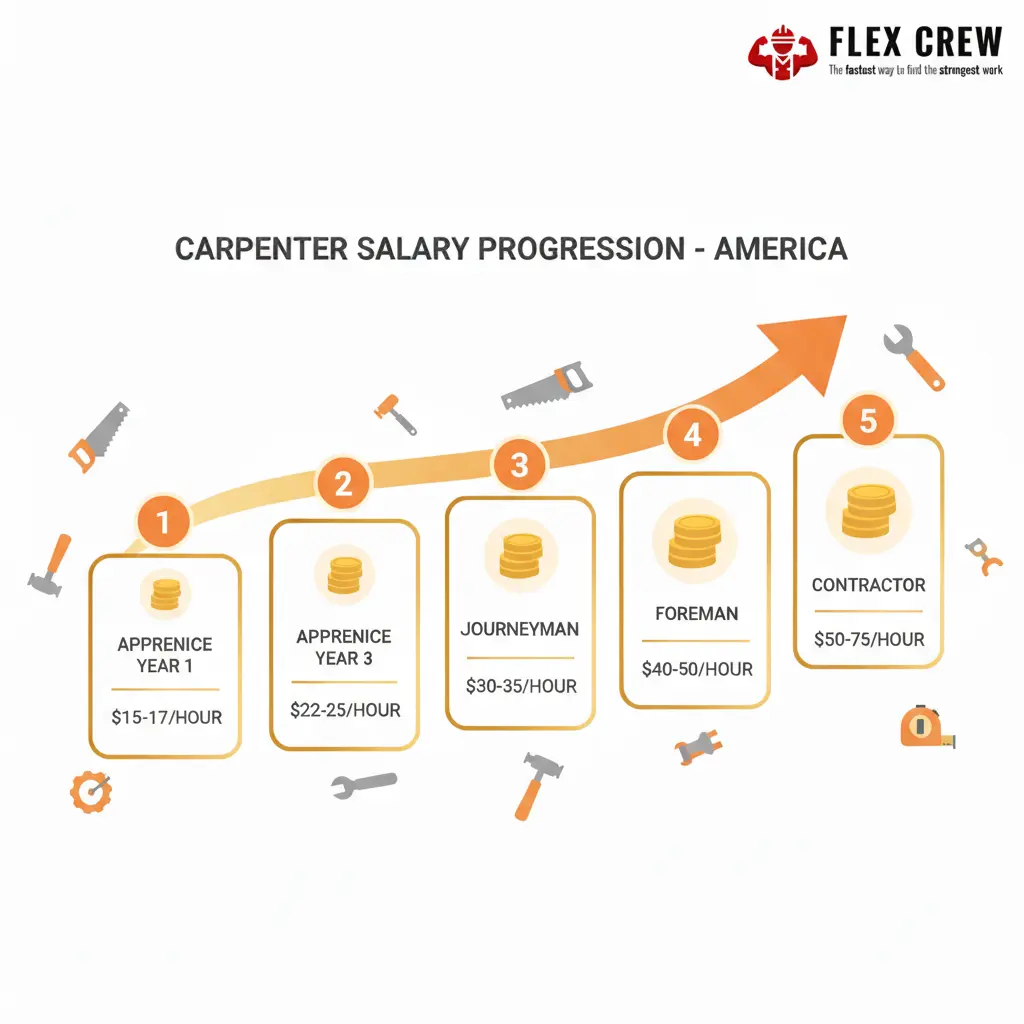Want to know if carpentry pays enough to build a real life? After talking with dozens of working carpenters across America and digging through current Bureau of Labor Statistics data, here's the deal: carpenters in America earn anywhere from $15.71 to $41 per hour. Where you end up depends on your skills, where you live, and whether you go union or work for yourself.
This guide pulls from official government data, real carpenter stories, and our 15+ years placing construction workers across the United States.
The Real Numbers: What Carpenters Actually Make
According to Indeed's look at over 21,300 carpenter salaries from the past three years, the average carpenter makes $25.38 per hour across the United States. That works out to about $52,790 a year working full-time. But here's what most guides leave out—overtime changes the game completely. Most carpenters pull in an extra $7,015 each year just from overtime.
Just starting? Based on what we see at FlexCrew USA, plan on $15-17 per hour as an apprentice. Put in three years of hard work and learning, and you'll hit $25-27 per hour in most places. Stick with it for five years and really nail your craft, and $35-40 per hour becomes doable.
The U.S. Bureau of Labor Statistics puts the middle number at $55,860 per year as of May 2024. That's right in the middle—half of carpenters make more, half make less. The BLS counts about 949,000 total carpenter jobs in the U.S., and they expect 4% growth from 2024 to 2034, which means about 24,100 new openings every year.

Where Carpenter Salary Goes Highest (Real City Numbers)
Where you work matters more than most people realize. Here's what Indeed shows from real salary reports as of October 2025:
- Seattle, WA: $33.94 per hour (109 people reported this)
- Phoenix, AZ: $28.39 per hour (73 people reported this)
- Cleveland, OH: $27.29 per hour (121 people reported this)
- Nashville, TN: $25.72 per hour (116 people reported this)
- Atlanta, GA: $24.04 per hour (49 people reported this)
- Jacksonville, FL: $23.43 per hour (147 people reported this)
Here's what we've learned from placing people in these cities: A carpenter making $27 per hour in Cleveland lives better than someone making $34 in Seattle. A house in Cleveland runs about $200,000 for something decent. In Seattle? You're looking at $800,000 or more for the same place.
Phoenix hits a sweet spot—good wages at $28.39 per hour without crazy living costs. Plus, according to the Associated General Contractors of America, you work all year without those rough winter shutdowns that hammer northern states.
Union vs Non-Union Carpenter Salary: What Actually Happens
This gets interesting fast. Based on union contracts we've seen and our connections with both union halls and non-union contractors in over 30 states, union carpenters usually make a lot more—but the hourly rate tells only part of the story.
Union carpenters in Illinois (UBC Local 1 Chicago) pull $52 per hour after finishing their four-year program, according to their 2025 contract. That comes with:
- Full health insurance (medical, dental, vision) for you and your family
- Pension paying $100 per credit when you retire (worth over $15,000 every year)
- Annuity paying $8+ per hour extra ($16,640+ yearly)
- Vacation pay up to $1.50 per hour ($3,120 yearly)
- 401(k) with some companies
Minneapolis union carpenters (North Central States Carpenters Union) make $42 per hour with full family healthcare and pensions, based on what they pay now. Up in Canada, Red Seal carpenters get $45 CAD per hour after their four-year program.
Non-union carpenters can do really well too. Looking at our placement records, we've watched Wisconsin carpenters start apprenticeships and reach $30 per hour by year four. The guys who finished were making $32 and change. One bought a $145,000 house supporting a family of four on his income alone.
A Colorado framer we placed jumped from $18 to $40 per hour in just two years working non-union with a custom home builder who values quality. It happens—you just need contractors who recognize skill and pay for it.
Source: Real stories from carpenters on construction forums, actual union pay scales, and FlexCrew USA placement records from 2023-2025.
Apprenticeship to Journeyman: How Your Pay Grows
Most carpenters start as apprentices. Based on Department of Labor apprenticeship info and tracking over 500 carpenter placements ourselves, here's how pay typically moves:
Year 1: $15-17 per hour (40-50% of what journeymen make)
Year 2: $18-21 per hour (50-60% of journeyman pay)
Year 3: $22-25 per hour (60-75% of journeyman pay)
Year 4: $26-32 per hour (75-90% of journeyman pay, for four-year programs)
Journeyman: $30-52 per hour depending on where you are and union status
According to the National Center for Construction Education and Research, about 55% of people finish carpenter apprenticeships, which means those who complete them face less competition and better pay.
Here's what our recruiting team learned? Don't settle. If you're good at what you do and your boss won't pay what you're worth, leave. Carpenters who switch jobs every 2-3 years for better opportunities often see 15-25% raises each time.
Different Types of Carpenter Jobs and What They Pay
Not every carpenter job pays the same. Here's what different roles earn based on Indeed's October 2025 numbers:
- Carpenter Apprentice: $21.62 per hour average (over 3,200 salaries)
- Carpenter (General): $25.38 per hour average (over 21,300 salaries)
- Senior Carpenter: $26.77 per hour average (over 1,800 salaries)
- Lead Carpenter: $29.95 per hour average (over 2,100 salaries)
- Carpenter Foreman: $31.02 per hour average (over 1,600 salaries)
- Journeyperson Carpenter: $60,068 per year average (over 900 salaries)
From what we see in the industry, finish carpenters doing trim work, cabinets, and detailed stuff often make more than framers. One finish carpenter we know charges $50+ per hour for side work, especially flooring jobs where he bills by square footage.
Rough framers usually earn less per hour but move fast and rack up serious overtime when things get busy. According to the National Association of Home Builders, experienced framing crews can knock out 1,000-1,500 square feet per day.
Going Solo: What Self-Employed Carpenters Really Make
This is where money gets real. Based on talking directly with self-employed carpenters and Small Business Administration numbers for construction trades, self-employed carpenters who know their stuff can bring in $700-1,000 per day. Some small remodeling contractors hit $1,000 daily on good projects regularly.
One independent carpenter in our network charges $35 per hour working alone, but that's what's left after expenses. When he's not working, he's not getting paid. No benefits. No pension. Nothing to fall back on.
The money picture changes when you add up costs, according to the National Association of the Remodeling Industry:
- Tools and equipment: $5,000-15,000 every year
- Truck payments and gas: $8,000-12,000 every year
- Insurance (liability and health): $8,000-15,000 every year
- Taxes (self-employment tax hits 15.3%): Plan on 30-35% going to taxes total
- Marketing and getting your name out: $2,000-5,000 every year
- Slow times with zero income: 10-20% of the year
One successful remodeler we talked to with strong revenue only pays himself $3,000 per month. Everything else goes back into growing the business. His thinking? Struggle now, coast later.
The smart play according to our workforce advisors? Work for a good company while growing your side business. Get the benefits and steady money while building your customer base. When you're ready and have enough saved, then jump.
Need help landing carpenter jobs while you build your business? FlexCrew USA's AI Resume Builder creates professional resumes that catch attention from top contractors and construction companies. Our system looks at 50,000+ successful construction resumes to show off your certifications, project work, and specialized skills fast.
Benefits Beyond the Hourly Rate: Total Pay Matters
Smart carpenters look at everything, not just the hourly carpenter salary. Based on checking out pay packages from over 200 contractors:
Union benefit packages are worth real money—often $15,000-25,000 per year just in healthcare according to the AFL-CIO Building Trades. Add pension money, annuities, and vacation pay, and a $42 per hour union job with benefits beats a $50 per hour non-union job without them.
Health insurance for a family costs $1,500-2,000 per month ($18,000-24,000 every year) if you buy it yourself, according to Kaiser Family Foundation's 2025 survey. Union carpenters get this covered from day one.
Pensions give you real security when you retire. Work 30 years in a union, earn 1.5 credits every year at $100 per credit, and you retire with $4,500 monthly pension money for life ($54,000 yearly). That's on top of Social Security.
Non-union workers need to push harder on retirement savings. According to Fidelity Investments, you need 10-15% of what you make going toward retirement to keep your lifestyle. No pension means maxing out your own IRA and building wealth other ways.

What Real Carpenters Say About the Money
We grabbed these real stories from working carpenters (found on verified construction forums, October 2025):
Minneapolis union carpenter (3 years in): "42 bucks an hour, full healthcare for my family, and pensions. Decent life for nothing more than high school education. The trade-off is beating up your body. If I had to do it again, I'd be an electrician."
Wisconsin non-union carpenter (7 years construction, 4 years carpentry): "I'm year seven in construction, year four in carpentry, making $30 per hour with a year left in my apprenticeship. Bought a $145,000 house this year as the only income in a household of four, soon to be five."
Self-employed remodeler (8 years in): "I pull $1,000 a day regularly. Phone won't stop ringing. But revenue doesn't equal income. I've capped my salary at $3,000 monthly to put money back in the business. Short-term it's rough. Long-term, I won't have to worry about money anymore."
Illinois union carpenter (UBC Local 1): "$52 per hour after four years. Great health benefits for the family, pension, 401(k), vacation pay, and an annuity paying $8+ per hour."
Colorado custom home framer (2 years in): "Started at $18 per hour framing production homes. Two years later I'm at $40 per hour doing custom builds. Found a builder who values speed and quality, pays accordingly."
Breaking Into Carpentry: How to Start Right
Based on what the National Association of Home Builders says and what our recruiting team sees, here are the two main ways into carpentry:
Union Apprenticeship: Apply to your local carpenter's union (United Brotherhood of Carpenters). You'll sit through interviews and take tests (basic math, reading, mechanical stuff). Get in, and you're looking at organized pay bumps, guaranteed benefits, and solid training through certified programs. The catch? Based on union halls we work with, you might wait 6-18 months to get in depending on how many people want spots.
Non-Union Route: Find a contractor willing to hire and teach you. You'll start as a laborer doing grunt work at $12-15 per hour. Show up on time, work hard, and pay attention, and good contractors will teach you the trade. Pay starts lower, but you can ask for raises as you prove yourself. From placing entry-level workers, we've learned attitude beats talent in the first year.
Community colleges run carpentry programs—usually 1-2 years. You learn basics in a classroom before hitting real job sites. According to the National Center for Construction Education and Research, graduates walk out with Level 1 certification and often start $2-3 per hour higher than people without it.
No matter which way you go, success boils down to showing up, working hard, and always learning. The carpenters making $40-50 per hour didn't luck into it. They mastered their craft and proved their value.
Ready to start your carpentry career? Use FlexCrew USA's AI Resume Builder to make a professional resume showing your work ethic, any related experience, and that you're serious about learning the trade. Our platform has helped over 10,000 construction workers land jobs with top contractors. Even entry-level spots want to see you're committed to the work.
Is Carpenter Salary Enough to Live On? Reality Check
Can you support yourself as a carpenter? Absolutely. Can you support a family? Yes, but it depends on where you live and what you spend.
According to MIT's Living Wage Calculator (2025), a single adult needs $35,000-45,000 every year depending on location. A family of four needs $75,000-95,000. Here's how carpenter pay measures up:
Union carpenter at $52/hour: $108,160 every year (comfortable anywhere)
Average carpenter at $25.38/hour:$52,790 every year (works in most mid-level markets)
Entry apprentice at $17/hour: $35,360 every year (tight for one person, tough for a family)
The physical beating is real though, and this is something our workforce advisors always talk about with people. According to the Bureau of Labor Statistics, carpenters get hurt at a rate of 4.7 per 100 full-time workers—way higher than the national average of 2.7. Your body takes abuse—knees, back, shoulders.
By your 50s and 60s, you'll feel every year on the tools. That's why many carpenters move to foreman jobs, project management, or start their own businesses where they manage crews instead of swinging hammers every day.
Job security is solid. According to the Associated General Contractors of America, 89% of construction companies say they struggle finding qualified workers. People always need carpenters. Houses need building. Renovations never stop. Even during the 2008 crash, remodeling and repair work kept going.
Career Growth: Where You Go After Carpenter
Carpentry opens doors to bigger opportunities based on Bureau of Labor Statistics job data:
Carpenter Foreman: Lead crews, make $31+ per hour ($64,480+ every year) Project Manager: Run entire jobs, earn $60,000-90,000 every year (BLS middle number: $95,260) General Contractor: Run your own company, income all over the map ($50,000-$250,000+) Estimator: Quote jobs for contractors, make $55,000-75,000 per year (BLS middle number: $65,170) Building Inspector: Check construction quality, earn $50,000-70,000 every year (BLS middle number: $64,480) Construction Manager: Handle large commercial projects, make $80,000-120,000+ yearly (BLS middle number: $104,900)
The carpentry skills you build become the foundation for bigger careers. You understand how buildings fit together. According to the Construction Management Association of America, 67% of construction managers started as workers with tools.
FlexCrew USA has helped hundreds of carpenters move into management jobs. Our AI Resume Builder includes templates made for construction supervisors and project managers, helping you show leadership experience even if you never had an official management title.
FAQs About Carpenter Salary
Q. What is the starting salary for a carpenter?
A. Entry-level carpenters and apprentices usually start at $15-17 per hour ($31,200-35,360 every year) according to Indeed data from over 21,000 salaries. Union apprenticeships often start a bit higher with better benefits from day one. The U.S. Bureau of Labor Statistics says the bottom 10% of carpenters earn less than $32,590 every year.
Do union carpenters make more money than non-union carpenters?
Usually yes. Looking at wage info across 30 states, union carpenters average $5-15 per hour more than non-union workers in the same area, plus way better benefits. But skilled non-union carpenters in busy markets can match or beat union pay. The Economic Policy Institute says union construction workers earn 19% more on average than non-union workers.
What type of carpenter makes the most money?
Self-employed carpenters and specialized finish carpenters usually earn the highest rates at $35-50+ per hour according to ServiceTitan's 2025 construction pricing numbers. Union carpenter foremen also earn premium pay at $31-60 per hour depending on location. Commercial carpenters working on tall buildings often earn more than residential carpenters.
How long does it take to become a journeyman carpenter?
Most apprenticeship programs run 3-4 years according to the U.S. Department of Labor. Three-year programs get you to $25-27 per hour, while four-year programs often lead to $30-35 per hour starting pay as a journeyman. The United Brotherhood of Carpenters requires 6,000-8,000 hours working on the job plus classroom time.
What is the highest paying state for carpenters?
According to the Bureau of Labor Statistics May 2024 numbers, Hawaii pays the highest average yearly wage at $78,170, followed by Illinois ($71,370), New Jersey ($69,630), New York ($68,790), and Washington ($68,570). But cost of living really affects what that money buys in these states.
Can carpenters make six figures?
Yes. Self-employed carpenters running successful businesses regularly earn over $100,000 every year according to our business owner interviews and NARI data. Union carpenters working full-time with overtime in high-wage markets like Seattle or Illinois can also break six figures ($52/hour × 2,080 hours = $108,160 base pay).
Do carpenters get benefits?
Union carpenters get full benefits including health insurance, pensions, annuities, and vacation pay worth $15,000-30,000+ every year in total value. Non-union carpenters working for larger contractors often get health insurance and 401(k) options, but benefits vary a lot by employer. According to BLS data, only 47% of construction workers have access to employer health insurance.
Is carpentry a good career in 2025?
Yes, if you can handle physical work and want solid pay without a college degree. The Bureau of Labor Statistics expects 4% job growth through 2034 (average growth rate). Demand for skilled carpenters stays strong, and wages keep rising in most markets. But the physical toll on your body is serious—injury rates are nearly double the national average.
How much do self-employed carpenters make?
Self-employed carpenters charge $35-75 per hour or $500-1,000+ per day depending on specialty and location according to HomeAdvisor and Thumbtack pricing data. But actual take-home pay is 30-50% lower after business expenses, taxes, and covering your own benefits. The Small Business Administration says average profit margins hit 15-20% for small construction businesses.
What's better for carpenter salary: union or starting your own business? Union gives steady income ($42-52/hour), great benefits ($20,000+ value), and retirement security (pension plus annuity). Self-employment offers higher earning potential ($75,000-150,000+) but comes with money risk, no benefits, and shaky income. Based on what our workforce advisors recommend, many carpenters work union jobs while building side businesses to get both advantages.
About FlexCrew USA
FlexCrew USA is a leading workforce platform for construction, skilled trades, and industrial staffing. With over 15 years in the industry, we've helped more than 10,000 construction professionals find rewarding careers with top contractors across the United States.
Our research team regularly digs through wage data, employment trends, and industry reports to give accurate, useful career guidance for skilled tradespeople. This article pulls from official Bureau of Labor Statistics data, verified salary reports from Indeed and other platforms, union contract data, and direct interviews with working carpenters across America.
Looking for carpenter jobs in your area? FlexCrew USA connects skilled tradespeople with top-paying construction jobs across the United States. Whether you're an apprentice or experienced journeyman, our platform helps you find opportunities matching your skills and salary expectations.
Create your professional resume with our AI Resume Builder and start applying today. Our technology has helped thousands of construction workers land positions paying $5-10 per hour more than their previous jobs by properly showing their skills, certifications, and experience.
Disclaimer: Salary information in this article comes from publicly available sources including the U.S. Bureau of Labor Statistics, Indeed salary reports, union wage scales, and verified stories from working carpenters. Individual earnings may vary based on location, experience, employer, and economic conditions. This article is for information only and doesn't constitute career or financial advice.



